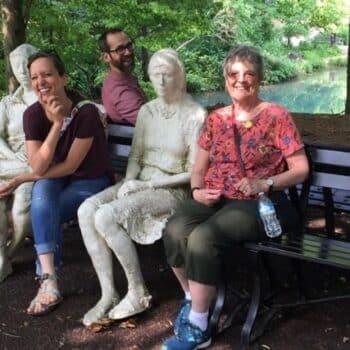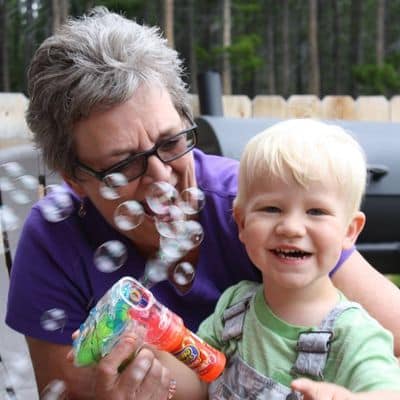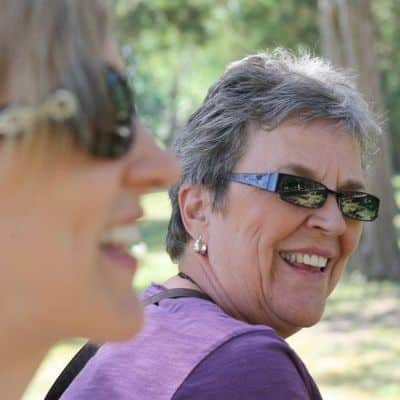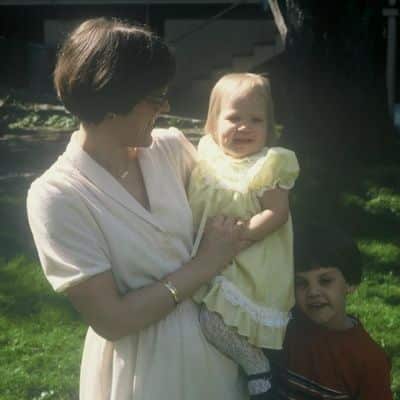Honoring My Mother’s Legacy: Navigating Alzheimer’s, Ambiguous Grief, and Healing Through Humor

I suggested we do what mom taught us to do in any difficult situation: talk about it. The three of us siblings took our experiences and turned them into a podcast.
February 26, 2025
Bethany Wallace is a long-distance, sandwich caregiver to both of her parents, along with her two siblings. Her mother was diagnosed with Alzheimer’s in 2022 and her father has dementia caused by Parkinson’s. She documents their journey on her Instagram page @momanddadhavedementia and through a podcast with her siblings.
“Make the covert overt” was one of my mom’s favorite sayings. It was her shorthand for telling us to confront the things we often avoided, to engage in tough conversations, even when it made us feel uncomfortable. To her, it was important to be honest about what we were feeling. As a marriage and family therapist, mom truly believed that self-awareness, reflection, and self-discovery were at the heart of a meaningful life. And so when her own self-awareness began to fade, we knew something was terribly wrong.
In 2022, shortly after the COVID-19 pandemic, Mom was diagnosed with Alzheimer’s disease. To make matters worse, she developed a neurological condition called Anosognosia. That means she doesn’t recognize or accept that she has a disease; a reality for more than 80% of people with Alzheimer’s. No matter how many memory tests she fails or how many doctors explain that her mind is failing, she refuses to believe or accept her diagnosis.

(For more context, click here)
Watching the changes in mom has been heartbreaking. Not only was she a fierce advocate for mental health and self-awareness, but was also the designated caregiver for my dad, who also has dementia. Mom was the glue that kept our family together—the one who organized family reunions, sent out birthday cards, and kept us updated through email and phone calls. The person who had taken on the chief role of family communicator had suddenly gone silent.
It was then that my two brothers and I had to step up. To say we were unprepared for the new roles thrust upon us would be an understatement. We now became the caregivers (in-person and long-distant) to mom and dad. We became the memory keepers, the storytellers, and the ones responsible for making hard decisions. Relatives began to turn to us for updates, looking to us for information about our parents.
In the early stages of mom’s diagnosis, I felt lost. I didn’t know how to cope. I didn’t understand what was happening or how to deal with the sadness of seeing the person who was my mom slip away. Later, I learned that this is called “ambiguous grief.” Researcher Dr. Pauline Goss coined the phrase ‘ambiguous grief’ to describe a situation where a loved one “is with us physically, but for one reason or another is no longer psychologically or emotionally present.”

Mom hadn’t died. That meant speaking about her situation with others felt difficult. How could I possibly explain the loss I felt when mom was still living?
After I had come to terms with the diagnosis, I started to remember her words– “make the covert overt.” And so I suggested we do what mom taught us to do in any difficult situation: talk about it. The three of us siblings took our experiences and turned them into a podcast. We hoped (and continue to hope) that by sharing our story, we might be able to help others in similar situations, or at the very least, help them to feel less alone.

What surprised me most was how often we found ourselves laughing uncontrollably during our podcast recordings. The podcast, titled “Mom and Dad have Dementia”, began as a way to process our grief and confusion. But it soon became a space where we could also find humor and lightness..
In many ways, the podcast has become a continuation of the work mom started. We are working to honor her legacy, keeping her voice alive, and embracing the difficult conversations she always encouraged. Through that platform, and by acknowledging the hard stuff, we are finding joy and healing.